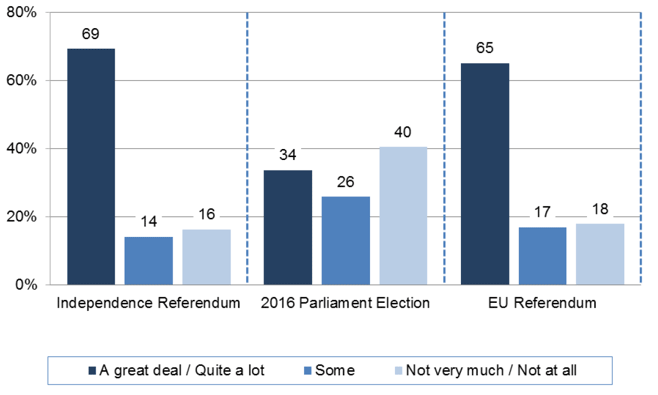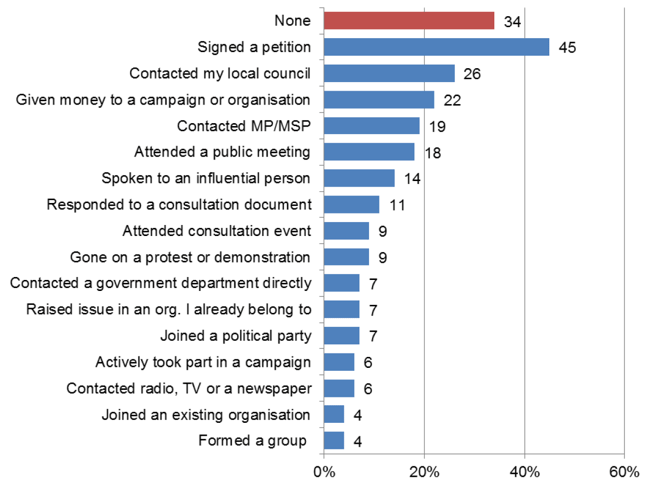Scottish social attitudes: attitudes to government and political engagement, 2016
Survey results on attitudes to government, political engagement, economy, standard of living and the NHS.
This document is part of a collection
4. Political engagement
The Scottish Social Attitudes ( SSA) Survey 2016 asked participants questions about engagement with the politics of Scotland, including a new set of questions designed to explore the degree of political engagement [13] as a result of key political events.
Participants were asked how often they spoke with friends, family or colleagues about particular political events: the 2014 Scottish Independence Referendum, the 2016 Scottish Parliament elections and the 2016 European Union ( EU) Referendum.
Additionally, people were asked whether the amount they now talk about politics had changed as a result of the 2014 Independence Referendum.
Further, existing questions on political engagement were also asked:
- if, and how, they had registered what they personally thought about an issue in the last few years according to a list of political activities
- their opinion on the importance of voting in UK, Scotland and local elections
In this chapter we present headline findings at a glance, and list subgroups who gave varying answers, based on statistical significance.
Talking about political events
Over two thirds (69%) of people said they had talked about the Independence Referendum 'a great deal' or 'quite a lot'. 65% said this about the EU Referendum. A lower proportion (34%) said this about the 2016 Scottish Parliament elections.
30% said they talked 'a great deal' or 'quite a lot' about all three of these political events with friends, family or colleagues
16% said they had not talked about the Independence Referendum 'much' or 'at all', the lowest figure of the three - 18% said this about the EU referendum and 40% about the 2016 Scottish Parliament election.
Figure 8 How often people talked about political events with friends, family or colleagues (%)

The majority of people (54%) said they talked more about politics in 2016 as a result of the Independence Referendum, while 40% said it had made no difference to how much they talked about politics and 6% said it had resulted in them talking less about politics.
Variations in attitudes between subgroups
How often people talked about all three political events varied with statistical significance between a number of social groups [14] :
- Interest in politics - 57% of those who were interested 'a great deal' in politics talked about all three events a great deal/quite a lot compared to 12% of those who had 'no interest at all' in politics.
- Economic activity - 41% of those currently in education talked about all three political events a great deal/quite a lot compared to 9% of those who were unemployed.
- Support for a political party - 38% of those who either supported or felt close to a political party talked a great deal/quite a lot about all of the events compared to 19% of those who didn't feel close to a particular party.
- Political activities - 36% of those who had engaged in at least one political activity in the last few years as a means of registering what they personally thought about an issue talked a great deal/quite a lot about all three events compared to 20% of those who hadn't engaged in any political activities.
- News source - 34% of those who read either a newspaper or the news online talked a great deal/quite a lot about all of the political events compared to 16% of those who read neither.
How often people talked about the EU referendum also varied according to:
- National identity - 81% of those who identified as more British than Scottish talked a great deal/quite a lot about the EU referendum compared to 61% of those who identified as more Scottish than British.
- Age - Over two-thirds (68%) of 16-24 year olds talked quite a lot or more about the EU referendum compared to 57% of those aged 65 and over.
How often people talked about the 2016 Scottish Parliament election also varied according to:
- Political affiliation - 42% of SNP supporters talked a lot about the Scottish Parliament election compared to 29% of non- SNP supporters.
- Educational qualifications - 36% of those with a degree or equivalent talked a lot about the Scottish Parliament election compared to 29% of those with no formal qualifications.
54% said they talked more about politics in 2016 as a result of the Independence Referendum. This varied among subgroups as follows:
- Age - 70% of 16-24 year olds talked more about politics in 2016 because of the independence referendum compared to 38% of those aged 65 and over.
- Interest in politics -68% of those with a great deal of interest in politics talked about politics in 2016 more because of the independence referendum compared to 22% of those with 'no interest at all' in politics
- Political affiliation - Over two-thirds (68%) of SNP supporters talked more about politics in 2016 because of the independence referendum compared to 46% of non- SNP supporters.
- Support for a political party - 62% of those who either support or are close to a political party talked more about politics in 2016 because of the referendum compared to 41% of those who don't feel support or feel close to a political party.
- Educational qualifications - 62% of those with a degree or equivalent talked more about politics in 2016 because of the independence referendum compared to 30% of those with no formal qualifications.
- Political activities - 61% of those who had engaged in at least one political activity in the last few years as a means of registering what they personally thought about an issue talked more about politics in 2016 because of the independence referendum compared to 40% of those who hadn't participated in any political activity.
- Economic activity - 60% of those in work talked more about politics in 2016 because of the referendum compared to 40% of those who are retired.
- Living comfortably - 58% of those who are living comfortably on their present income talked more about politics in 2016 because of the independence referendum compared to 36% of those struggling to live on their present income.
- Tenure - 58% of home owners talked more about politics in 2016 because of the independence referendum compared to 37% of social renters.
Political Activities
People were asked whether they had engaged in any political activities in the last few years as a means of registering what they personally thought of an issue. Two thirds (66%) of people participated in at least one of the political activities listed in the survey in 2016. The average number of different activities people had done was 2.1.
Figure 9 Political activities

The most popular activities were:
- 45% had signed a petition.
- 26% had contacted their local council.
- 22% had given money to a campaign or organisation.
- 19% had contacted an MP or MSP.
- 18% had attended a public meeting.
Engagement in political activities had remained at a similar level to 2015. In 2015, 69% of people had engaged in at least one political activity and the average number of political activities people had engaged in was two [15] .
Variations in attitudes between subgroups
The number of political activities people had engaged in the last few years as a means of registering what they personally thought an issue varied between a number of social groups as follows: [16]
- Interest in politics - The mean number of political activities people participated in according to their interest in politics ranged from 4.7 political activities for those with 'a great deal of interest' to 0.8 political activities for those with 'none at all'.
- Political spectrum - The mean number of political activities people on the left of the political spectrum participated in was 2.4, compared to 2.5 on the right of the spectrum and 1.6 in the centre.
- Educational qualifications - 78% of those with a degree or equivalent participated in at least one political activity compared to 50% of those with no formal qualifications.
- Age - 74% of 16-24 year olds participated in at least one political activity compared to 58% of people aged 65 and over.
Importance of voting
91% of people said that voting in Scottish Parliament elections was 'very important' or 'fairly important'. For local council elections, this figure was 87% while for UK general elections it was 84%.
Over three-quarters (77%) of people said that voting was very or fairly important in all three elections while 5% of people said voting was not very or not at all important in all of the elections listed.
In 2005, 82% of people said that voting in Scottish Parliamentary elections was 'very important' or 'fairly important'. For local elections this figure was 82% while for UK general elections it was 85%.
In 2005, 74% of people said that voting was very or fairly important in all three elections while 9% of people said voting was not very or not at all important in all of the elections listed.
Since 2005, there has been a 9 percentage point increase in the proportion of people who thought voting in Scottish Parliament elections was important.
Variations in attitudes between subgroups
Views on whether voting in elections was important varied between a number of social groups [17] as follows:
- Scottish Index of Multiple Deprivation ( SIMD) - 87% of those in the least deprived quintile (20% of areas) said voting was important compared to 62% of those in the most deprived quintile.
- Support for a political party - 84% of those who either supported or felt close to a particular political party said voting in all elections was important compared to 67% of those who neither supported nor felt close to a political party.
- Interest in politics - 81% of those with any interest in politics said voting in all three elections was important compared to 41% of those with 'no interest at all' in politics
- Political activities - 82% of those who had participated in at least one political activity in the last few years as a means of registering what they personally thought about an issue said voting in all three elections was important compared to 67% of those who had not engaged in any political activities.
- Religious identity - 82% of religious people said voting in all elections was important compared to 73% of non-religious people.
- Sex - 80% of women said voting in all three elections was important compared to 74% of men.
Contact
Email: Sarah Martin
There is a problem
Thanks for your feedback